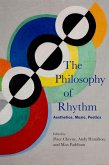Music has been examined from multiple perspectives: as a product of human history, for example, or a product of human culture. But there is also a long tradition, intensified in recent decades, of thinking about music as a product of the human mind. Whether considering composition, performance, listening, or appreciation, the constraints and capabilities of the human mind play a formative role. The field that has emerged around this approach is known as the psychology of music. Written in a lively and accessible manner, this volume connects the science to larger questions about music that are of interest to practicing musicians, music therapists, musicologists, and the general public alike. For example: Why can one musical performance move an audience to tears, and another compel them to dance, clap, or snap along? How does a "hype" playlist motivate someone at the gym? And why is that top-40 song stuck in everyone's head?
ABOUT THE SERIES: The
Very Short Introductions series from Oxford University Press contains hundreds of titles in almost every subject area. These pocket-sized books are the perfect way to get ahead in a new subject quickly. Our expert authors combine facts, analysis, perspective, new ideas, and enthusiasm to make interesting and challenging topics highly readable.
Dieser Download kann aus rechtlichen Gründen nur mit Rechnungsadresse in A, B, BG, CY, CZ, D, DK, EW, E, FIN, F, GR, HR, H, IRL, I, LT, L, LR, M, NL, PL, P, R, S, SLO, SK ausgeliefert werden.









